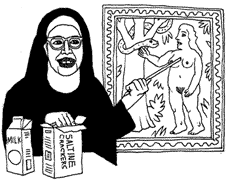
Television
Sister Wendy's Story of Painting (PBS; Sundays, 9 p.m. EDT/PDT). Critics swoon over the eccentric 67-year-old Carmelite nun's survey of Western painting. "Nothing this good in the genre has come out of England since Kenneth Clark's Civilisation a quarter-century ago," says the Los Angeles Times' William Wilson. The self-taught Sister is said to be charmingly enthusiastic, and to "awaken an appreciation for a sweeping spectrum of art ... for the average schmo" (Megan Rosenfeld, the Washington Post). Reviewers predict the ratings for her series will surpass critic Robert Hughes' similar show last spring. (PBS plugs the program.)
Ally McBeal (Fox; Mondays, 9 p.m. EDT/PDT). Ambivalent reviews for a drama about an insecure twentysomething female lawyer. Critics say it "respects the audience's intelligence" with well-drawn characters and a "healthy cynicism" about lawyering (Caryn James, the New York Times). But it also uses unfunny gimmicks, particularly a running gag of dramatizing, on-screen, the protagonist's fantasies. (See Fox's site for the show.)
Movies
She's So Lovely (Miramax Films). A movie by the son, Nick Cassavetes, from a screenplay by the father, John Cassavetes, who died in 1989. The film is deemed a gesture more of sentiment than of artistry. Critics discern little logic in the story, in which two men (John Travolta and Sean Penn) duel over an alcoholic woman (Robin Wright Penn). The characters' motives are also damned as obscure. "[Y]ou might wonder whether 15 or 20 pages of [script] ... hadn't fallen out," says the Los Angeles Times' Jack Mathews. But a handful of critics admire Penn's and Travolta's "big, headstrong performances," and proclaim the film "a huge-hearted emotional fairy tale" (Janet Maslin, the New York Times). (Click here for David Edelstein's review in Slate, and here for the official site.)
Sunday (Cineplex Film Properties). Another Sundance Grand Jury Prize winner--this one by rookie director and part-time sommelier Jonathan Nossiter--generates critical excitement. Nossiter's script about an affair between a homeless man (David Suchet) and a woman (Lisa Harrow) who mistakes him for a British filmmaker is called "elegant" (Daphne Merkin, The New Yorker), and Suchet is said to give "a virtuoso turn" (John Anderson, the Los Angeles Times). Dissenting, the New York Times' Stephen Holden calls the film a formulaic, "overly schematic exercise in cinematic hide-and-seek."

Books
The Farewell Symphony, by Edmund White (Knopf). As with the earlier installments of White's semiautobiographical trilogy (A Boy's Own Story and The Beautiful Room Is Empty), critics dwell on the graphic gay sex scenes and on the writer's promiscuity (he estimates having had 2,000 partners). It "might have been more honestly called Hilly Buttocks I Have Known," says James Wolcott in the Wall Street Journal. Those who don't dismiss it as salacious gossip laud its revelations about gay New York writers, especially the poet James Merrill, and its depiction of the ravages of AIDS. "[A] powerful critique of the lifestyle [he] once eulogized," says Bruce Bawer in the Washington Post Book World.
America in Black and White: One Nation, Indivisible, by Stephan and Abigail Thernstrom (Simon & Schuster). A mammoth new tract on race by a Harvard professor and his wife, a Manhattan Institute pundit. Foes of affirmative action extol the book--part history, part policy analysis--as a devastating blow to race-based programs. "[T]he most far-ranging, information-rich analysis of our seismic racial shifts since Gunnar Myrdal's An American Dilemma of 1944," says Jim Sleeper in the Wall Street Journal. In the New York Times Book Review, however, Nicholas Lemann says, "To assume the Myrdal mantle means speaking in a calm, clear, generous voice, but America in Black and White does this only intermittently. ... [The book is] pugnacious and angry to the point of occasional bitterness and sarcasm."
Recent "Summary Judgment" columns
Movie--G.I. Jane;
Movie--Mimic;
Book--Already Dead: A California Gothic, by Denis Johnson;
Book--The One Best Way: Frederick Winslow Taylor and the Enigma of Efficiency, by Robert Kanigel;
Music--The Dance, by Fleetwood Mac;
Television--Good News (UPN).
Movie--Cop Land;
Movie--The Full Monty;
Music--Be Here Now, by Oasis;
Theater--1776;
Theater--On the Town;
Television--George Wallace (TNT);
Books--A Fan's Notes, by Frederick Exley, and Misfit: The Strange Life of Frederick Exley, by Jonathan Yardley;
Book--Apaches, by Lorenzo Carcaterra.
Movie--Conspiracy Theory;
Movie--Love Serenade;
Television--Vibe and TheKeenenIvoryWayansShow;
Event/Television--Garth Brooks in Central Park/Garth Brooks Live (HBO);
Art--"Sculpture of Angkor and Ancient Cambodia: Millennium of Glory";
Book--Simenon: A Biography, by Pierre Assouline, translated by Jon Rothschild;
Book--Dispatches From the Freud Wars: Psychoanalysis and Its Passions, by John Forrester.
Movie--Career Girls;
Movie--In the Company of Men;
Movie--Spawn;
Book--Our Guys: The Glen Ridge Rape and the Secret Life of the Perfect Suburb, by Bernard Lefkowitz;
Book--Faith or Fear: How Jews Can Survive in a Christian America, by Elliott Abrams;
Death--William S. Burroughs;
Opera--Palestrina.
--Compiled by Franklin Foer and the editors of Slate.
